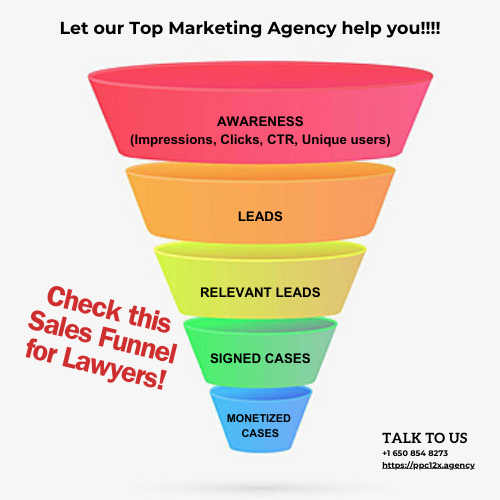Digital Marketing For Lawyers: Where To Spend Your Budget To Maximize Your ROI
In the present day, digital marketing is indispensable for lawyers due to the transformative influence of online platforms on how legal services are sought and accessed. Having a strong digital presence is no longer a luxury but a necessity, as individuals increasingly turn to the internet to find legal information, research potential attorneys, and seek assistance. A strategic digital marketing approach allows legal professionals to showcase their expertise, build credibility, and connect with a broader audience. Moreover, it enables targeted outreach, ensuring that law firms can reach potential clients with specific legal needs. As consumer behavior evolves, an effective digital marketing strategy becomes a key differentiator, helping lawyers stay competitive, enhance visibility, and establish meaningful connections in a digitally-driven era. In the US alone, there are more than 1.3 million lawyers, to be more precise, there were 1,331,290 active lawyers as of Jan. 1, 2023, according to the ABA National Lawyer Population Survey.
According to the 2023 Websites & Marketing TechReport of American Bar Association, the marketing activities respondents’ firms hire an outside consultant or agency to undertake include:
- Website design (42%)
- SEO (28%)
- Social media (27%)
- Print marketing (9%)
- Online leads (9%)
- AdWords/PPC (8%)
- Directory listings (6%)
- Direct mail, tv ads, online promotions (3% each)
Law firms like social media. Nearly 9 out of 10 lawyers (89%) said their firms are on social networks. Most firms that use social media are on LinkedIn (87%) and Facebook (62%). Only a third use X, formerly Twitter, (38%) and Martindale (37%).
A professional and user-friendly website serves as the foundational element, providing a virtual storefront for potential clients. Search engine optimization (SEO) is crucial to enhance online visibility, ensuring that legal services surface prominently in relevant searches. Engaging content creation, ranging from informative blog posts to legal guides, establishes authority and fosters trust. Social media platforms serve as valuable tools for connecting with a diverse audience and sharing legal insights. Reviews and testimonials contribute to building credibility, while email marketing enables personalized communication. Paid advertising, such as pay-per-click campaigns, can be leveraged for targeted outreach. Embracing video marketing, webinars, and online events further amplifies the capacity to showcase legal expertise. Analytics tools help gauge the effectiveness of digital efforts, allowing for strategic refinements. Ultimately, a well-rounded digital marketing approach is essential for lawyers and law firms to navigate the competitive online landscape, connect with prospective clients, and reinforce their professional standing.
PPC12x Marketing Approach For Law Firms.
1. Curated website that bring results
A curated website designed to deliver optimal results for lawyer services combines a clean and professional design with user-friendly navigation. The site strategically highlights specific practice areas, offering detailed information, case studies, and client testimonials to establish credibility. Engaging and informative content, regularly updated through a blog, addresses common legal queries, positioning the law firm as an authoritative resource. Clear calls-to-action prompt visitors to inquire or schedule consultations seamlessly. Mobile responsiveness, SEO optimization, and integration of interactive elements enhance the user experience. Social media links and video content add a personal touch, fostering trust and connection. By adhering to legal and ethical standards, this website aims to not only attract but convert visitors into clients, ensuring a strong online presence and successful client acquisition.
2. Expertise in Legal SEO
Expertise in legal SEO is crucial for law firms aiming to enhance their online visibility and attract clients. Legal SEO involves optimizing the firm's website for search engines using targeted keywords, relevant content, and strategic meta tags. A deep understanding of legal industry trends and the competitive landscape is essential to create a tailored SEO strategy. This includes optimizing for local searches, as many legal services are location-specific. Professionals with expertise in legal SEO stay abreast of changes in search engine algorithms and implement best practices to ensure the firm's website ranks high in search results. By effectively navigating the nuances of legal SEO, law firms can establish authority, reach their target audience, and ultimately drive organic traffic to their website.
3. Legal Marketing Strategy and Approach
Authenticity is Pure Branding Gold.
A dual focus on branding and direct response is paramount. Branding establishes a unique and compelling identity for the legal practice, conveying its values, expertise, and commitment. This involves creating a consistent visual presence across platforms, articulating a clear message, and fostering a reputation that resonates with the target audience. Concurrently, direct response marketing serves to generate immediate client engagement and conversions. Utilizing targeted online advertising, compelling call-to-action messages, and strategic outreach, lawyers can prompt immediate responses from potential clients. The synergy between branding and direct response ensures that the law practice not only builds a lasting and recognizable image but also efficiently converts leads into clients. Striking this balance enables lawyers to establish trust and credibility while actively driving client acquisition through strategic and measurable marketing initiatives.
The Legal Advertising Funnel Approach
Advertising for law firms relies on a funnel model that maps the customer journey from initial awareness to case resolution. At the top of the funnel, prospective clients discover the law firm, while the bottom marks successful resolution and payment. A well-structured advertising funnel, particularly in pay-per-click (PPC) campaigns, ensures a seamless journey, reducing the likelihood of potential clients seeking legal representation elsewhere. The PPC funnel starts with impressions, measuring how often an ad appears. Clicks follow, leading to inquiries or leads. Crucially, a successful funnel distinguishes between relevant and irrelevant leads, emphasizing the importance of tracking performance metrics. The ultimate goal is signed cases, but even this marks only the penultimate stage. The final conversion gauges the number of signed cases that ultimately monetize, highlighting the prolonged timeline in legal advertising. This complexity underscores the need for meticulous data aggregation and performance metrics to connect today's clicks with revenue generated years later, especially considering the extended timeline in legal cases compared to other industries.
Key Performance Metrics
Cost per Click (CPC): CPC represents the amount a search engine charges when someone clicks on an advertisement. Despite its significance in revealing the precision and competitiveness of keywords, CPC alone does not determine a campaign's effectiveness. Understanding the entire conversion funnel is crucial to interpreting CPC accurately, as acquisition costs depend on multiple factors beyond click costs.
Cost per Lead: This metric reflects the total cost for each person contacting a law firm. Although it's often overemphasized, the importance of cost per lead lies in benchmarking and identifying issues like website rendering or phone line malfunctions. The average cost per lead can serve as a valuable diagnostic tool to uncover and rectify campaign irregularities.
Cost per Relevant Lead: This metric focuses on defining relevance based on a law firm's criteria, allowing for consistent lead classification. Acknowledging the challenge of distinguishing between relevant and irrelevant leads, this metric helps set benchmarks for evaluating advertising campaign quality.
Cost per Acquired Case (CPA): CPA, the holy grail of metrics for law firms, signifies the cost per signed client. This metric's acceptability depends on each firm's business model, underlining the necessity of accurately tracking CPA and integrating lead management systems to assess ROI and financial viability.
Cost per Monetized Case: Understanding that not every signed case translates to revenue, cost per monetized case calculates the percentage of cases that successfully monetize. This metric helps evaluate the financial impact of a campaign and informs decision-making regarding case acquisition costs.
Average Value per Resolved Case: Knowing the average value per resolved case is vital for setting CPA parameters. It enables law firms to assess their financial position by understanding the revenue generated per case handled, which is critical for financial sustainability.
Return on Advertising Investment (ROI): Calculated by dividing case revenue by advertising dollars invested, ROI is a crucial metric for evaluating the overall effectiveness of an advertising campaign. Establishing an acceptable ROI involves considering profit margins, and a general rule of thumb is aiming for an ROI of 5.0x, with acceptable cost per monetized case determined accordingly.
4. PPC Advertising (Pay-Per-Click)
PPC advertising, or Pay-Per-Click, is a highly effective digital marketing strategy for lawyers seeking targeted online visibility. In PPC, advertisers only pay when their ad is clicked, making it a cost-effective method. For lawyers, this means the ability to tailor campaigns to specific legal keywords, ensuring their ads appear prominently in relevant search results. Platforms like Google Ads offer extensive targeting options, allowing law firms to reach potential clients based on location, demographics, and search behavior. Crafting compelling ad copy and utilizing strategic landing pages are essential in converting clicks into inquiries or consultations. PPC advertising provides measurable results, enabling law firms to track the performance of their campaigns and adjust strategies accordingly, making it a valuable tool for client acquisition in the competitive digital landscape.
5. Social Media Presence
Establishing a strong social media presence is imperative for lawyers to engage with clients, build credibility, and expand their reach. Social media platforms such as LinkedIn, Twitter, and Facebook provide avenues for lawyers to share legal insights, updates, and valuable content with their audience. By regularly posting informative articles, case studies, and client testimonials, lawyers can showcase their expertise and establish themselves as trusted authorities in their respective fields. Social media also offers opportunities for direct engagement with clients, enabling lawyers to address inquiries, provide guidance, and foster meaningful connections. Building and maintaining an active social media presence allows lawyers to stay top-of-mind among potential clients while effectively communicating their value proposition in the digital realm.
6. Email Marketing
Email marketing is a powerful tool for lawyers to nurture relationships with clients, share valuable legal insights, and drive engagement. By building an email list of clients and prospects, law firms can send targeted newsletters, updates, and educational content directly to their audience. This not only helps in maintaining regular communication but also reinforces the firm's expertise and professionalism. Personalized email campaigns can be designed for specific practice areas, providing relevant information and showcasing recent successes. Email marketing enables lawyers to stay top-of-mind, nurture leads, and encourage repeat business. Additionally, it serves as an effective channel for promoting events, webinars, or special offers, contributing to client retention and new client acquisition.
If you’re struggling to grow your practice, PPC12x, a boutique digital marketing agency, will help you grow your firm’s revenue and profitability. From a curated website that brings results, robust SEO campaigns to lead generation tactics, we’ve got you covered.
For many years, we’ve helped small law firms, solo attorneys plus established legal experts across a range of practice areas and geographic locations get more cases, increase their ROI, and grow their law firms.
PPC12x offers Agency Solutions, 1.1 Consultations and Fractional CMO services. Over 3,000 projects successfully delivered, $5M+ ad budgets managed, 15+ years strong. Contact Us at +1 650 854 8273 or email us at hello@ppc12x.agency

